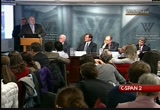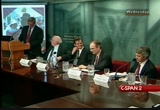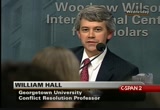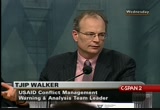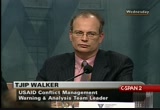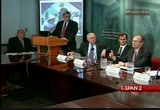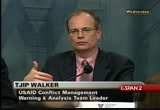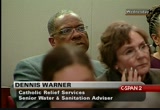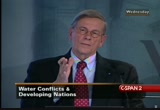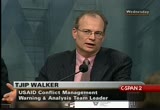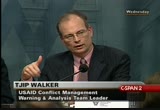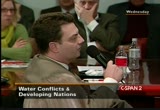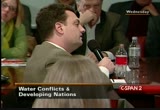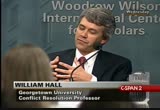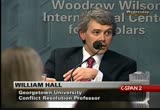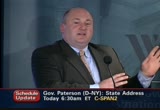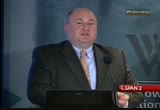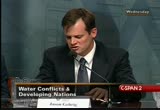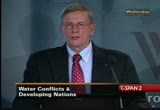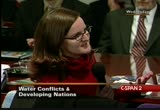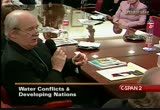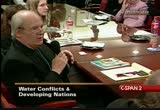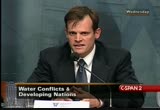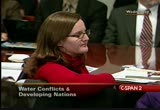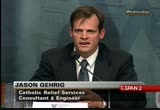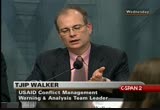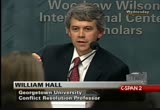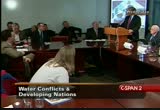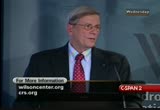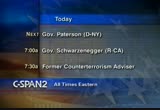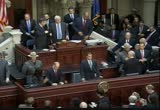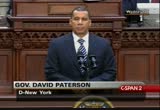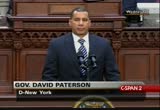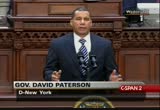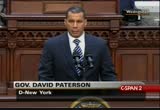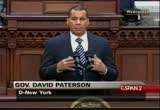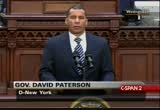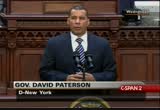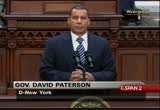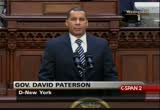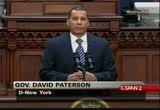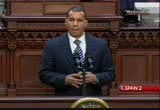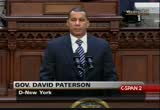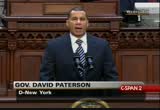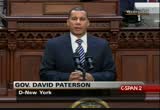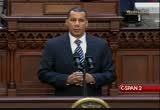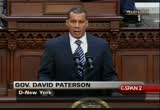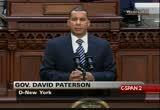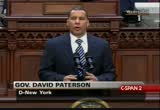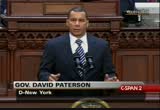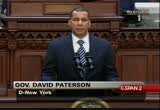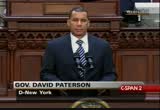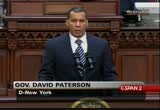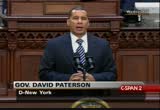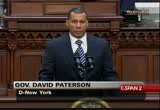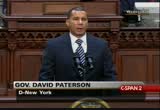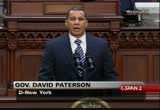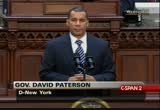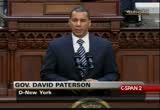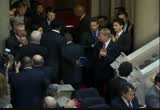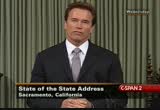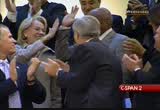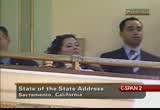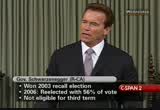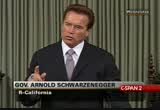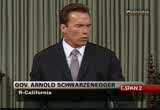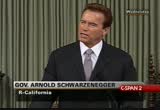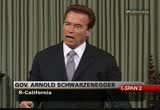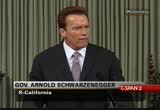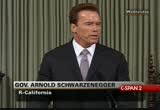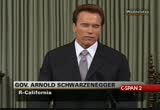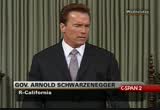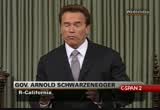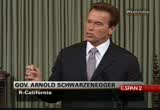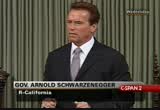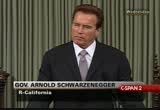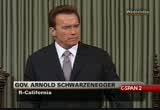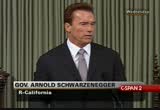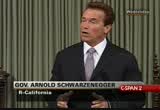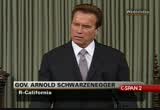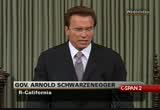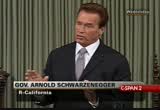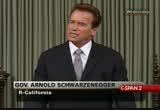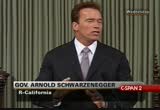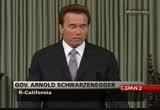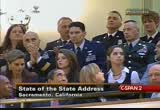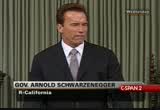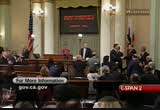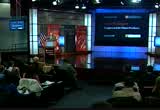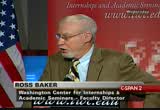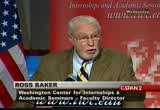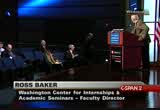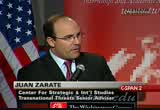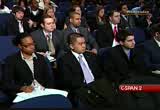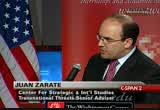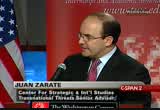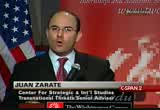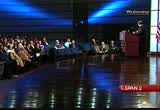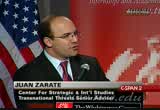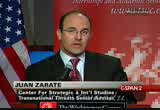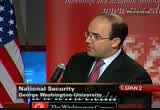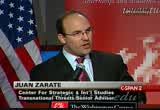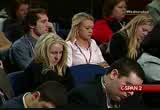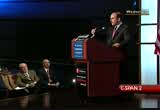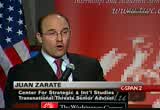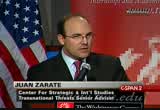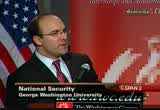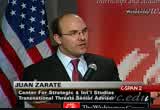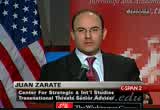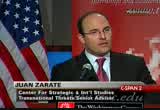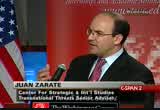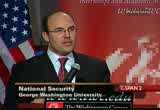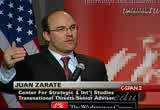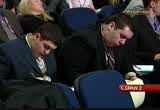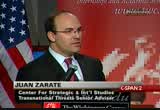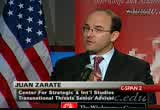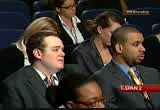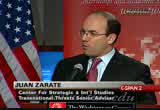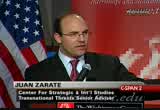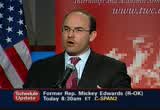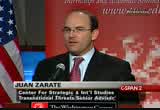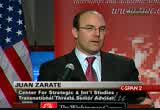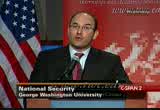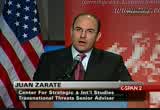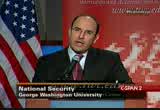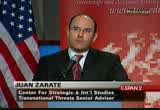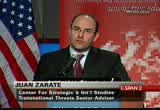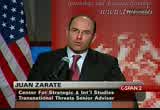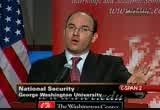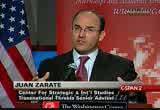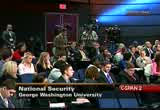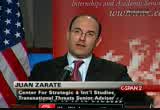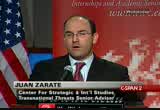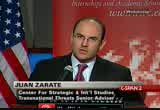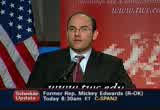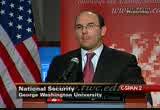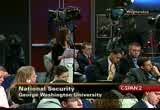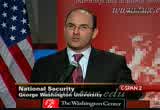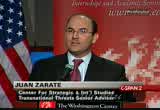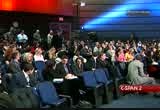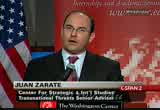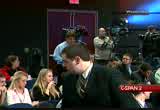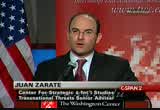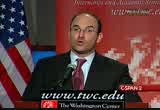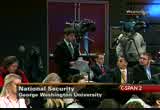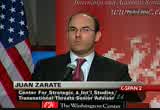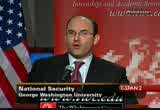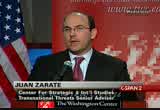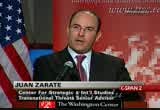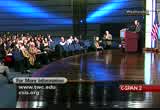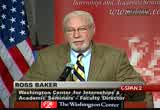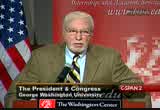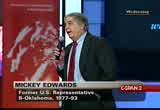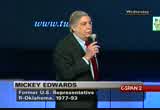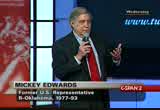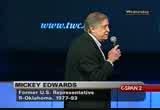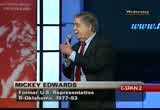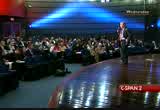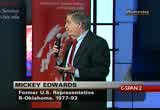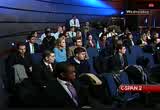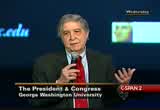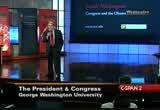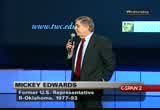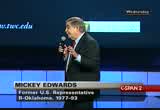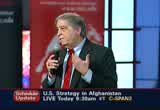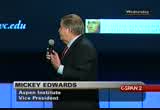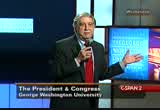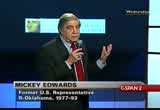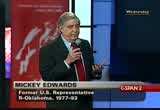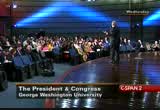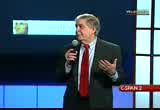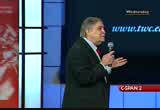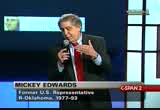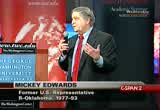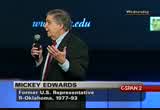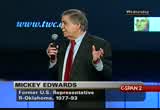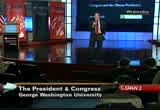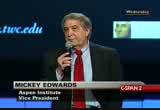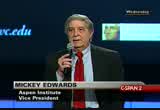tv Today in Washington CSPAN January 7, 2010 6:00am-9:00am EST
6:59 am
7:00 am
attorney general brown, treasure, secretary of state bowen, insurance commissioner, superintendent of public instructions, members of the board of equalization, all my cabinet secretaries, my chief of staff, and numbers of the legislature. it's good to see everyone together again. i would like to just introduce a few guest i have up in the gallery. first of all, my wife and first lady, maria shriver, and our four children. [applause] >> my friend, secretary george
7:01 am
7:02 am
[applause] >> and also we have chancellor jack scott, community college chancellor, big hand to him also. [applause] >> and then we have a very, very, very special guest here, sierra grantor, who overcame great obstacles who became an attorney. let's give a special big, big hand. [applause] >> now i want to begin with a true story from which we can
7:03 am
draw one lesson. as you may guess, the schwarzenegger household is something of, often bodybuilder, a tv journalist, four children, a daughter a hamster, and so forth. in recent years we added a miniature pony and a pot bellied pig. that's not unusual for me to look up from work on the budget or something and to find the pig in the pony standing right in front of me and staring at me. [laughter] >> now, the dog food which we keep in the canister, with a screwed on lead, sits on top of the dogs canister. the pony has learned how to knock it off and then he and the pig push it into the quarter. there's a switch on the lid of the canister, and the pig, with his doubt, pushes this around and around until it loosens up. then they roll the canister around on the floor until all the food spills out and then of course, they go to town and eat
7:04 am
it. now, i have no idea how they figured all this out, to delay the truth. if a human figuring out fire that it's the greatest example of teamwork, and i love it. its teamwork. so one lesson to draw from the pig and the pony story is, of what we can accomplish when we work together. last year, we here in this room did some great, great work together. and we had a pig in a pony year. i want to make sure now that it before some reports right that i compared this legislator with pigs and ponies, that that is not the message. the message is about working together, teamwork. together, as a team, as uncertain as it might have been, together we got california through the front end of the worst financial crisis since the great depression. although, not without pain, we close the budget gap of
7:05 am
$60 billion. this decisions were very hard for both sides of the aisle. on republican side we had leaders who sacrificed their careers and put them at risk. and the democratic side we have legislators who were threatened by their own interest groups. those on both sides of the aisle, took these risk, for the good of the state, you have my deepest admiration. we did what we had to do. we made painful spending cuts. we passed temporary tax increases. we permanently eliminated state programs. we made major reforms. there are two accomplishments in particular that i want to recognize here today. just last night, we passed major reform, for that once seemed impossible, that one now become law as soon as it hits my desk. for too many years, too many children were trapped in low performing schools. the exit doors may have well
7:06 am
been changed. now for the first time, parents without the principles permission, have the right to free their children from this destructive schools. that is great freedom. also in the past, parents had no power to bring about change in their children's schools. but that would not change also. parents will now have the means to get rid of incompetent principals, take other necessary steps to improve their children's education. and to increase accountability we finally broke down the firewall so that teachers performance can't be linked to student performance. so those are great, great accomplished and come and congratulations to all of you for that report. [applause] >> for decades the state was in a literal war. with old and deep divisions. more than california versus southern california, democrats versus republicans, farmers
7:07 am
versus environmentalist, businesses versus labor, and the list goes on and on. but we here in this room made history. with the most comprehensive water package in nearly half a century. we brought all the stakeholders together. we were working together we got it done but now we must work very hard so that we passed the $11 billion in water balance this november. democrats and republicans will have to travel up and down the state to educate the people of california of why these bonds are so important because some people say how can we afford those bonds in a current economic climate? i say, how can we not? it is the law that you cannot build a school. or that you can build a factory. or that you cannot build an office building or housing development without identifying first a source of water. as a result, huge projects with thousands of jobs have been put on hold. our economy cannot grow without
7:08 am
water. our population cannot live without water. it is our states lifeblood. now is exactly the time to invest in it so that californians turn on the faucet, safe and reliable and clean water coming out of their tap. and not just five years from now, but 30, 40, and 50 years from now. that is so important. now let's talk about the coming year. if i had to summarize in one word our focus for the coming year, it would be the word priority. we have to get them straight and keep them ordered the first priority for the coming year is to get the economy and get jobs back. jobs, jobs, jobs. the people -- [applause] >> the people and businesses of california and engine of self
7:09 am
government and progress them as long as government keeps the engine oil with good policies, and more important is not poor stands in its gears, the state will persevere and prosper. i will come to the main thing with what we can do to help the economy and a moment, but there are for proposals to spur job growth that i will introduce. first, it will receive a 500 million-dollar jobs package that we estimate could trade up to 140,000 workers and help create 100,000 jobs. second, you will receive a measure to streamline the permitting of construction jobs that already have a completed environmental report. and third, to stimulate other construction jobs you will receive a proposal for a homebuyers tax credits of up to $10000 for the purchase of new or existing homes. [applause] >> and forth, since we want california to be a dynamo of
7:10 am
free technology i asked you to pass our proposal, exempting the purchase of green from the sales tax. that, too, means jobs. [applause] >> there are jobs for the new economy. that while we still have a long way to go, the worst is over for california's economy. and four real good thing is that we have the right economic mix going forward. high-tech, green tech, biotech, hollywood tech, farm tek, so on and so forth are our economy as well as it position but let me to the main thing that we here in this chamber can do to help the economy and to help create jobs. we can be a better partner to the economy. because the state and government has responsibility, not to be an obstacle to success, but to be a partner in prosperity. to strengthen the economy which is the foundation of all jobs, we here in this chamber must
7:11 am
reform california's budget system and we must reform our tax system. there will be a huge stimulus. the basic problem is that our tax system does not reflect our economy. in 2009, california's economic growth declined only like 2.8% but our tax revenues were down by more than eight times that much. out economies the worst whereas our tax system is not. 144,000 taxpayers paid almost 50 percent of all personal income taxes. think about that. 38 million californians have to rely on 144,000 people for their schools, fire protection, health care, public safety and so many other services. that makes absolute no sense. here's what we need to accept that our economy is 21st century, and our tax system is 20th century. it is not in the wrong century.
7:12 am
the tax reform commission did its work. it came up with a plan to reform, a great, great reform that was praised by both. willie brown and "the wall street journal," that often does that happen? [laughter] >> the commission proposed major radical reforms. some people right away say that they are too bold and does, it will be too hard to enact. what do they mean by too bold? all this what we do in california, and what do they mean by too hard to? if i hesitated in my career every time i made a move because it was hard, i would still be yodeling in austria. [laughter] >> we must begin work on these tax forms because we simply cannot wait for the rich to bounce back. state revenues are not expected to return where they were until 2013 and 2014. i sent you a tax reform commission's plan. i send you the plan in late
7:13 am
september. but it seems that it has somehow disappeared out of its dome. where is it? may be the pig in the pony have taken it. that's what it is, but you know something? i'm looking for to working with the legislature to get this done. and budget reform is just as important. this is something that i've been talking about since i become governor of this great state. the budget crisis is our katrina and we knew it was coming. we have known it for years. and jet, sacramento would not reinforce its economic levey spirit and in addition to taking action on the tax commission's plan, i ask you to also take action on the best practices, budget accountability act, which has been drafted by the reform group for california out of the leadership of bob hertzberg, of course. i especially support his proposal for the performance-based budgeting. and applying one time spikes in revenues to one time users, such as debt reduction,
7:14 am
infrastructure, and creating a rainy day fund. the leaders of this party have said, and have said it many times, that the legislature should be given a chance to enact its reforms before reforms go directly to the people. here's the chance. i urge you to take it. and as we struggle to overcome our differences, what i ask you to remember is that the current tax and budget system is cruel, i kyc that it is cruel because it is forcing us to make a selfish choice amongst our obligations. which child to recut? is it a poor one or is it the sink when? is at the uneducated one or is the one with the special needs? that is cruel. we overcame the divisions and water. i know that we can also overcome our obstacles and divisions on tax reform. and a taxis and the budget system. let's do it. i will address out immediate budget situation in a few days
7:15 am
and i present my budget, but let me just give you an overview. we face a $19.9 billion deficit. six-point $6 billion for the rest of this budget year, and $13.3 billion for the upcoming budget year. big picture. let me tell you what will be required here. first, as bitter as the words are, we face additional cuts. we know what that means that we know the pain it entails. i mean, what can we say at this point except the truth. that we have no choice. but i'm drawing this line. because our future economic well being is so dependent on education, i will predict and education funding in this budget. [applause] >> and we no longer can afford to cut higher education either.
7:16 am
[applause] >> but priorities have become out of lack over the years. i mean, think about it. 30 years ago 10 percent of the general fund went to higher education, and only 3% went to presence. today, almost 11% goes to presence and only 7.5% go to higher education. spending 45% more on prisons and universities is no way to proceed into the future. [applause] >> what does it say about our state? what does this say about any state that focuses more on prison uniforms that none can turndowns? it simply is not healthy. so i will submit to you a constitutional amendment so that never again do we spend a greater percentage of our money on prisons than on higher
7:17 am
education. [applause] >> the way we get this done is to find more cost-effective ways to run our prison system and a loud private prisons to compete with public presence. competition and choice are always good. i mean, california spends $50000 per prisoner. by comparison to the 10 largest states, has spent $32000 only. they spend less and yet they do not see federal charges taking over. why do we have to spend so much more than they do? if california's prisons were privately run, it would save us billions of dollars a year. that's a billions of dollars that could go back into higher education where it belongs and where it better serves our future. [applause] >> choosing universities over prisons is a historic and
7:18 am
transforming realignment of california's priorities. if you have two states and one spends more educating, the other one spends more incarcerate, in which states economy would you invest? so i ask you, to make the right choices for california. another major item is this. federal funds have to be part of our budget solution because the federal government is part of our budget problems. when president clinton was in office, california got back $0.94 on the dollar from the federal government. today, we only get $0.78 back. but in the meantime, texas gets $0.94, pennsylvania $1.07 to alaska with all the dog and gets back $1.84 for every dollar and guess what new mexico gets? $2.03. this should be much more fair and equitable. we are not looking for federal bail out. just for federal fairness.
7:19 am
[applause] >> california to carry also special burdens since we are a border state that the federal government alone controls immigration policy. it alone controlled border security that while acknowledging its response become the federal government is not even funny a 50/50 split of the cost of undocumented immigrants or when no longer can ignore what is owed to us. or what we are forced to spend on federal mandates. we are currently owed billions of dollars by the federal government for various different programs. we need to work with the feds so we can fix the flawed, that demands that the state spends money that we do not have. and now, congress is about to plow billions of more on california with their new health care bill. net as you know, what i and susie support health care reform, it is not reform to push
7:20 am
more calls on the states that already are struggling while other states are getting sweetheart deals. health care reform which started as a noble and needed legislation has become a dwarf of private deals and loopholes. yet, you have heard of the bridge to nowhere, but this is health care to know where. california's congressional delegation should either vote against this bill that is a disaster for california, or get in there and fight for the same sweetheart deal that senator nelson of nebraska got for the cornhuskers date. because he -- [applause] >> because of that senator got for the cornhuskers state the court and the bigger house to. [laughter] spent another priorty related to the budget is pension reform. the cost of state employees pension is up for 2000 percent in the last 10 years but you
7:21 am
heard me right, 2000% while revenues have increased by 24%. the pension fund will not have enough money to cover this amount. so the state, that is of course the taxpayer, have to come up with the rest of the money. that they are already put in there every year more than $3 billion. that amount will go up to $10 billion. this is money that is taken away from important government services. this is money that cannot go to our universities and our parks and other government functions. for the current employees, this pension cannot be changed. either legally or morally. we cannot break a promise that we have already made. this is a done deal. but we are about to get run over by a locomotive. we could see the lights coming at us. we can see the lights coming. i ask the legislator to join me in finding the equivalent of a water deal on pensions. so that we can meet the current
7:22 am
promises, and yet reduce the burden going forward. this is serious issues that our state faces. every year in spite of whatever challenges, i stand up here and tell you how much i believe in california's future. haiku you how much i believe in the dream and how this is the greatest place in the world that some people always say, yeah, yeah, this is arnold being so optimistic that but i'm not alone believing these things. time magazine recently did an article about california that sounded just like one of my speeches. i would like to read to you just a few sentences that time magazine wrote. california still a green state. in fact, the pioneering mega state and still the cutting edge of the american future, economically, and finally, demographically, culturally, and maybe politically that it is the greatest and most diverse state in the most globalized and the
7:23 am
world is heading in all those directions that it's also an unparalleled engine of innovation, the meca of high-tech, biotech, and now clean tech. and in 2008, california economy, attracted still more venture capital than the rest of the nation combined. so now do you believe you? you see what i'm saying. this is the greatest place in the world. california has the means and the mind power to solve all its problems. sometimes we just need to step back. a couple of months ago, i was in iraq visiting our men and women in uniform that this is the second time that i've been over there. and it was quite a great expense. of course, we have someone alvar californians over there serving. i had breakfast with him. we chatted. we worked out. i pumped them up. took pictures with them.
7:24 am
and told him all kinds asserted they had seen, and they have seen expenses that they cannot even believe. many have served two of the tour after tour. and as a result some have lost homes, spouses, limbs and even their lives. too often our soldiers bring back the emmy with them in their heads. we are seeing and hearing all about a lot of the posttraumatic stress dissenter, the suicide rate is too hard. those men and women need help. california has more returning veterans than -- [applause] >> california has more returning veterans than any other state, so our state as well as the federal government has a special responsibility.
7:25 am
you will see that in our agenda. we have a fundamental obligation to anyone who has shed a wrist love for this country. that is a priority. [applause] >> their sacrifice is extraordinary. it never fails to inspire me. and if you look up to the gallery, ulysses on california is wearing the uniform of our country that just came back from iraq and afghanistan so that men and women, brave men and women, i say welcome home. welcome home. [applause]
7:26 am
[applause] >> no matter how big the problems are that this state is facing, no matter how harsh things they seem to us in the months ahead, those californians in uniform will tell you, that this is still the greatest place to come home to and the greatest place to pursue a better life. just ask them how often they dreamt of a being back here home in the golden state. so ladies and gentlemen, in closing, we in this chamber must fulfill our sacred trust to keep california for great place to come home to for our men and women in uniform, and for generations of californians yet to come. thank you very much, and god bless all of you.
7:28 am
for global women's issues talks about supreme court justice ruth bader ginsburg, a changing world of women in law and the rights of women around the world that on c-span's america and the courts. >> american icons, three original document is from c-span. now available on dvd. a unique journey through the iconic homes of the three branches of american government. see the exquisite detail of the supreme court. go beyond the velvet ropes of public tours of the white house, america's most famous home. and explore the history, heart and architecture of the capital. american icons, a three disc dvd
7:29 am
set. it $24.95, plus you begin and the. one of the many items available at c-span.org/store. now an event with former deputy national security adviser, for counterterrorism, juan zarate. he's a former bush administration official who also served in the treasury department tracking sources of funding for alleged terrorist groups. washington center for internships and academic seminars hosts this event that he speaks for an hour. >> is my time to welcome our first guest speakers today, juan zarate. zarate, to the inside washington weeklong seminar, congress and the obama presidency. this program is one that brings to washington undergraduate students from all over the united states. i've been associated with this
7:30 am
program as faculty director for about 10 years. and this is a program which is very dear to my heart. and we have consistently had some of the best, most authoritative speakers available. and cerda, this is true of juan zarate. there is a scene in the 1975 movie about the watergate invasion, all the presidents men. and there's a meeting in an underground washington garage and watch how holbrook, playing an informant known by the name of deep throat, tells robert redford playing bob warburg, the "washington post" reporter, that if he wants to find out who is responsible for the water great burglary, at democratic party headquarters, at the watergate, you should follow the money. well, we have some here today who has followed money. in his capacity as deputy
7:31 am
assistant secretary of the treasury. and this was a job that really involves one of the most complex tasks in the antiterrorism effort. that have these people get their money, how they spend their money, and it takes a person with uncommon diligence and uncommon intelligence to be able to try to track this data, including for example, the assets of saddam hussein. but juan zarate went on from there, from the treasury department, to the national security council, where he responsible for the major part of the government, u.s. government counterterrorism strategy involving transnational security threats, counter narcotics, maritime security, hostagetaking, international organized crime. so his portfolio was a very broad one. so not only has juan zarate
7:32 am
follow the money, he is followed a lot more than the money. and mr. zarate will become a professor at the roddy on the 16th of may, when he becomes the faculty director for the washington senators weeklong program, top secret national security and a global society which will run from the 16th to 21st of may right here in washington. and we will fit in with his cap and gown when the time comes. juan zarate, welcome. [applause] >> doctor baker, thank you for that kind introduction. thank you for the invitation today but i also wanted thank the others for helping me i am looking for to be a part of the washington center team and leading a discussion. i want to leave as much time for open discussion as possible
7:33 am
because there have been so many important issues in the news, including what doctor baker was talking about, the presidents meeting yesterday with respect to the terrorism threat and how it's involving. so i want to talk a bit, set the stage, but can also make sure that we got plenty of time for questions and answers. i've been quite proved over the last eight years in the positions i felt as doctor baker mentioned, in particular the national security council, over the last four years in the second term of the bush administration. i was responsible for the national security council's strategic look at all transnational threats, not just counterterrorism, but international organized crime, drug trafficking. and in that context as well as in my role at the treasury department, looking at terrorist financing, financial times, i was able to see what i think was an incredibly important evolution in her nationally. and in terms of our national security. what i'd like to do with a few
7:34 am
minutes that i have with you today is to talk about that changed international landscape, that change national security picture, which i think frames and so many of the issues that we are facing today, friends a lot of the problems that i think the national security council has, as well as the political establishment has. and then also affects the relationship between congress and the executive, moving forward, which is the topic of your seminar in series this week. i think in many ways 9/11 was not just a shock to the u.s. national security system, but i think it was a momentous event in ushering in a new era of international security. one in which a new paradigm in assets was introduced, where individuals networks, and the cells operating from the darkest corners of the world could have
7:35 am
great geopolitical impact. using tablets of modernity. i think 9/11 in many ways has not only should our response over the last eight years, but will continue to shape how we look at international security over the next few decades, if not centuries. this is an environment that is defined by factors that i think are well-known to you all, but i think are important to put in context. increasing globalization where, what happens in one country, can ripple across the world and affect others. i think the recent financial crisis is only underscored the dimensions of the interconnectedness of the world. this is an environment in which there is a proliferation of information, good, bad, indifferent. conspiracy theories, truths, the wikipedia era, the web 2.0 era
7:36 am
of social networking, where information is instantaneous, information is widely distributed, and can be had in any corner of the world. it's also an era in which the means of destruction can be catastrophic, and could be available to individuals and networks. i think this recent case of the abdulmutallab, the bomber who attempted to explode the devise on the flight to detroit is a very good example of individuals being able to use relatively simple explosive devices to create catastrophic effects, even in failure, even in failure having major political ramifications on a geopolitical scale. and one could then only imagine what would have been if terrorists or networks or cells
7:37 am
were to use weapons of mass destruction, biological agents, radiological devices, or even, god forbid, a nuclear device. but those means of distraction are out there, the information about them is widely available, and it will only disseminate further in the future. in addition, i think 9/11 as well as the current environment demonstrates, and i think this current debate about what to do with human is part and parcel of this comment is that no corner of the world can go ignore it. in the 21st century, the world is so interconnected, individuals are so easily able to connect with the western world and with modernity, that there is no corner of the world that can be ignored. that goes not only for terrorism where you have safe havens in places like the tribal region of western pakistan, the tribal regions of northern or eastern or western yemen, the lawless
7:38 am
land of somalia, but also with respect to issues like health, where a pandemic can start in one corner of the world and rapidly spread to the rest of the world. and so we have much different landscape given the nature of how interconnected the world is. in addition, you have in a sense a cheer or a taxonomy of the nationstates of the world. some with great capacities, others faltering, others bordering on being failed states, and others plainly being failed states. and so you have a full spectrum of countries that are in many ways unable to do with some of these transnational threats and issues. and in some cases, either willfully blind to some of these threats, or complicit in the threats. and then finally, there are issues of resources and
7:39 am
demographics, which i think become increasingly more important over the coming years, if not decades. there is the rush for resources. we see this in china's attempts to acquire access to oil and other precious resources around the world here we see this in the question of the water resources in the middle east. again, another key question, the context of yemen which has diminishing water resources. in addition, you have questions of demographics. the center for strategic and international studies where i am a senior adviser, has put up an incredibly important study called the grain of the great powers, where the study talks about the aging of the old western powers. in particular, western europe. and then the demographic and youth in places like the middle east. i think questions of demographics with the effects on the economy, effects on health,
7:40 am
affects on national security will continue to be important to. and so i think we are witnessing a new era, frankly, in which our national security is tight intimately with the international security environment around the world, and to every corner of the world. and in aspects, for example, in the financial crisis of our existence in society that previously had not been considered part and parcel of our national security, such as our economic security. this has real-world ramifications. i think that there is an example is the easiest one to think about in this context, where known actors, cells, networks, and work in small groups, or even as individuals, to create havoc for the world. and they can operate from anywhere in the world, whether it was the afghanistan of the
7:41 am
pre-9/11 world, the western pakistan of the last three years, or the yemen somalia of today that these are areas of the world that are uncovered or undercovered, and areas of the world where individual actors themselves can plot, train, and in essence create geopolitical havoc from these regions. you have this in the complex of al qaeda but you have other groups that are important to watch, and which could have geopolitical impact. the group, the kashmiri terrorist group that was once supported by the pakistani government now banned by the pakistanis, which was responsible and has been responsible for a number of attacks in india to include the mumbai attacks of last things getting. and i will tell you, there are many holidays when we lost our holidays in the white house because of terrorist acts. we had to spend lots of time dealing with the aftermath, the
7:42 am
handiwork of some of these nefarious actors. but that attack, the mumbai attack i think is emetic of precisely of what i'm talking about in that you have a group of individuals, 10 actors, able to move into a major city, a major international city, taken hostage lederle for three days, captured the attention of the world, bring two nuclear powers in south asia to the brink of nuclear war. and they're able to do it with regular weaponry, with just 10 individuals, with some training and probably backing from others, but able to in essence bring geopolitical havoc in wreak havoc based on their own agenda. you have the same -- same dynamic with hezbollah, and lebanon. where a group that was born in
7:43 am
opposition to israel has become a global terrorist group over the past two and a half decades. a group that is supported by iran, and is trying slowly to become more and more a part of the social and political fabric of lebanon. but it's a group that has its own agenda. as many have described it, including in lebanon, as a state within the state, a network of actors, both within lebanon and internationally, who serve their own purposes and who do not subscribe necessarily to the westphalian model of power, which is defined prior generations. what is interesting about this is not just that you have these groups out there, but i think we'll will be important to watch in the future is how these groups, and other loose affiliations and networks, drug trafficking groups, international organized crimes, smuggling networks, all
7:44 am
interact. i think there have been some very important and revealing cases recently that demonstrate this. for example, the dea recently unsealed an indictment in which they allege that a number of individuals tied to al qaeda and the islamic, this is the al qaeda group in north africa, were responsible for drug trafficking from south america, largely venezuela, and through west africa, and then north africa, and into europe. and so what you had in that case is a demonstration of what can evolved in this new environment where international networks can not only adapt, but can start to collaborate and work together. and so you've got a drug trafficking networks out of south america tied to an al qaeda group in africa affecting security issues, not just in
7:45 am
that region, but then also in europe. and you have been, i think the prescription for potential disaster when you look at the facilities of some of these groups to work internationally. the nightmare scenario in this context, by the way, if some of these groups collectivize and for purposes of approximate or ideology. to use or smuggle a weapon of mass distraction. one of the things we worried most about in the national security council was al qaeda or other groups have expressed an interest in obtaining and using a weapon of mass distraction, to actually get access to it. and they could get access to it, perhaps, through some of these unaffiliated networks, crime or smuggling networks. will we know in the past there has been a radiological devices or nuclear material smuggled. for example, in central asia. and so, this is the world in
7:46 am
which these networks and individuals can interrelate very easily, very effectively using the implements of modernity, whether it's airplanes and travel, or the internet, or elements of information sharing that make them an incredibly potent. i think this then, also speaks to the information environment we're in. where the web 2.0 technologies of today, the ability to move money via cell phones, the ability via chat rooms and blogs, affects the environment where and from a national security perspective. again, you see this playing in the terrorism context where you have individuals who are radicalized are drawn to terrorist groups via the internet, radicalized, the use of commutative tools as we've seen, for some, and the fort
7:47 am
hood case where the alleged perpetrator, doctor hassan, with the meeting with an american yemeni cleric to seek guidance theologically. and so this is a different era in terms of information or it's also different era in the context of how social movements operate. because not only can the bad guys, the networks using these technologies and these phenomenon, but you have social movements, for several, the green movement in iran relying very heavily on these new technologies to commute eight, organize, and to plan moving forward. and we have seen the importance of twitter, facebook, and a lot of these movements. one of the things we saw when i was at the national security council was a growing movement against terrorism using these technologies. there was one movement in particular that was incredibly effective in using facebook to
7:48 am
draw out a global protest campaign against the fark that this is the narco terrorist organization in colombia. one individual using facebook was able to organize rallies, not just in columbia, but worldwide against the farc use of kidnapping and other use of violence against colombian citizens and others. that i think is an important demonstration of the power of these technologies to actually impact local security issues and geopolitical security issues. but i think one of the challenges for us and our national security complex is beating in this new environment. you know, our national security system and the way the international security structures are established rely on a state to state westphalian model for how to deal with
7:49 am
issues. we build in the latter part of the 19th century and in the 20th century a state-based model for international relationships, where countries and alliances of countries, and balances of power between countries, defined how we were securing ourselves as well is how we were dealing with some of these transnational ills. the problem with that model in this current context is, it is not nimble enough nor can it take full account of some of the nonstate dynamics that actually impact geopolitically in ways that in the 20 century perhaps were unimaginable. and so i think one of the huge challenges for any administration, and for any national security professional moving forward, is trying to figure out not only what does this environment look at and not only how do we defend against some of these potential cataclysmic events and alliances, but how do we then
7:50 am
use the implements and the levers of power in this new environment, things like technology, and things like twitter and facebook, two online dynamics internationally and conditions and create conditions internationally that align with our national security interest. a great example of this is the question of what to do to help with the green movement in iran, assuming we want to help with the green movement, and there is political debate about how much we want to be doing that openly. that's a good debate. but there is a more fundamental question too, is if we did want to help you if we wanted to use technology, or have technology serve as a lever. what does that look like? how do we think about the use of facebook and twitter, and web 2.0 social networking? and access those four individuals in oppressive question whether sconces are trying to suppress access to the
7:51 am
internet. how should we think about that as a national security issue? not to mention as global citizens. answer that becomes incredibly important. in addition, how do we think about the power of nonstate actors like ngo's? which have incredible resources, incredible access in parts of the world where we may not as a u.s. government, for example, have access. groups like the foundation which is a multinational, huge in jail conglomerate with access and resources and humanitarian work in places like south asia and africa. how do we think about them and how should we work with them? and how should we leverage their power and influence without thinkingnb them? these are all critical questions and questions that have yet to be answered fully. and finally, how do we from a legal perspective, and this then gets into the role of congress,
7:52 am
how do we structure legally how it is that the u.s. government deals in this environment? for example, under current law, the state department is restricted from messaging into the united states or to u.s. citizens part of a broad set of rules to avoid the u.s. government from propaganda, which is good. we live in a free open society. we don't need the government, you know, propagandizing. that said, in the age of the internet, in the age where communication is borderless, how does one define communications in the country and to american citizens, and communications outside? and what does that legal framework look like? that has yet to be answered. and those other types of legal questions that i think need to emerge. and i think congress has a major hand in this. and i think, unfortunately, the history of congressional action
7:53 am
on national security issues has largely been one of the being reactive. after the fact that dealing with the last case anew. the 9/11 commission, commissioned by congress, to do with the prior event. all of the commission, then hearings, usually has to do with the last threat, the last thing that happened. and congress by its very nature is not nimmo and is not necessarily outfitted to be looking around the corner, or to the near horizon for the next threat. but i think there are certain things that we need to look at. i just mentioned one in terms of how we think about information and the ability of the u.s. government to deal in this new environment, but there are other issues that congress needs to be engaged in. one example, and something that was mentioned in op-ed today in the "washington post," something i've been talking about as well, is the need to talk openly and
7:54 am
honestly and to establish between executive and congress, a legal regime and an legal paradigm that deals with the problem of terrorism as we understand it in the 21st century. the major political debate, and some of it is rhetorical, is whether or not we are at war with terror. are we at war with al qaeda. what is the right legal paradigm. should abdulmutallab have been treated as in any combatant or as a criminal defendant? these are important questions, but the reality is that we have failed yet to come to grips with the fact that we are in a middling war. we are neither fully at war in the classic sense of state to state combat with all of the rules and international strictures that apply to that. neither are we fully and a legal complex are part of this have to do with the multiple theater
7:55 am
dimension of what we're talking about. there are actual wars, people shooting at each other in places like afghanistan and places like yemen, places like somalia. it's hard to say that those are criminal environment, or those are solely acts of criminals. at the same time, it's hard to argue in particular with our european colleagues that this is a war paradigm, because to many of our european colleagues, the threat of terrorism and radicalization is a mix them in their city streets, in the streets of london or manchester, or copenhagen or paris. and so it's very hard than with the multiple theaters at play when we're talking about the terrorism threat of the 21st century, to say we're in one paradigm or the other. and i think one of the things we have failed collectively as an american society to do is to decide how we're going to deal with this threat. and to deal with it in a way that, not only appears
7:56 am
legitimate perhaps to the international committee, but is it constitutionally legitimate. much of the debate in a prior administration surrounded the military commissions act and the military commissions, but i think the larger question of how to deal with known terrorist actors who are trained, connected to this international network, but against whom we may not have sufficient evidence to present in a criminal context or even a military commission context, what do you do about those threats. remained initiative and useful yesterday in the president's address where the president said, that with respect to the many detainees and ensemble, given the conditions on the ground in yemen, that we would suspend any further transfer of eumenes to yemen. and i think it's a recognition not only of the threat in yemen, but of the fact that you cannot return no terrorist actors into an active theater of battle or environment. especially where those individuals are going to present
7:57 am
a threat. and if you look back, and i would recommend that you look back and read this, i'm hopefully put this material in our course in may. but if you look back at the president's important speech at the national archives in may, he says very explicitly that we will not -- he will not, we will not release individuals who are a danger to the u.s., regardless of whether or not we have enough evidence to present to court and he admits quite openly, andy and i would ask you to read this, that we are going to hold people against whom we are not able to bring charges, either in a criminal context or a military commission context. so we're talking about a preventive detention model under the u.s. legal system. not under the bush administration, but under the obama administration which has talked so much about bringing the rule of law to the war on terror. so i think in this context it becomes incredibly important for there to be a consensus in the
7:58 am
u.s. as to how we're going to address this problem booting forward. because this isn't just a problem of guantanamo. guantanamo is a symptom of this larger legal question and legal or not him. and we need to figure out how we're going to do with it moving forward. because as we've seen, even in this most recent incident in detroit, the problem is not going away. and as the president said yesterday, we're going to have to continuously adapt to do with the problem. and so congress i think and administration have a responsibility to set forth a legal paradigm and regime that explains this. that his constitutional and that is defensible, not just here at home but also abroad. and that's something the president committed to a main. i think the administration backed away from it a bid, and is in the op-ed today i think that's a shame. and i agree with her.
7:59 am
one other point with respect to how we deal with this nonstate environment, this new national security environment. again, i think we are not very good at figuring out how to use nonstate actors and individuals from the good side. to actually affect our national city interest. another example from the terrorism realm is how do you deal long-term with the problem of this radical violent extreme ideology which purports to be based in islam that is radicalizing individuals, that is drawing people to the battlefront, whether it's in pakistan or somalia, or leaving them to think about committing suicide attacks here in the united states. what do you do about this? and i think one ofifñ the answes may not be the complete answer, but i think a core part of the answer, the solution and the rejection of this ideology has to come from within muslim
8:00 am
communities themselves, both within the united states, but also abroad. and frankly and hopefully, many voices are starting to emerge to counter the ideology of al qaeda, as was the ideology of some of the violent ideologues which support al qaeda's broader agenda. we don't have much about it in the u.s. media, but these are voices, courageous voices in muslim communities beginning to emerge, many in a grassroots context. to start to oppose al qaeda's agenda. . .
8:01 am
counters the ideology. that is incredibly important movement to watch and see how they are able to work internationally. these are things that are happening organically. one of the problems we had when i was in government and we still have in the national security complex is figuring out how to harness these organic trends they google networks, credible voice is, even levers of power in a way that influences our national security and doesn't taint them. many individuals don't want to be associated with the united states government. it is not just a matter of going out and funding them but how do
8:02 am
we create the conditions that will be beneficial to our national security, understanding that those are best affected by non state actors or networks? what does that look like? the challenge of the coming decade if not decades will be not only recognizing this national security environment but figuring out how we address the eschews traditional defend ourselves against the most severe threats, and positively affect the environment through the same dynamics. with that i would love to take any questions you may have and love to continue the dialogue. [applause] [inaudible]
8:03 am
>> how is it going? dennis bonner, my question pertains to the fort hood massacre a few months ago. sarah palin said that she would support profiling against muslims in the army if it meant saving lives. do you agree with that? >> i don't think profiling is the answer so i don't agree with that. i think the reality is the vast majority of muslim americans are incredible patriots, loyal to the country including those who served in the military and the past. we need to be very careful that we not allow incidentss like the fort hood massacre to create artificial divisions in our society.
8:04 am
the strength of our society and certain counterterrorism's callers have pointed to this is we have a society that is integrated, population and ethnicities and cultures from all over the world. one scholar friend of mine has said that the best counter to the radical ideology that the united states has is the reality of the american dream, the fact that you can come to this country, be considered an american, fries here, have your children do well and be part of the society. that is incredibly important. there are a number of very important and courageous muslim americans who worked in the federal government and with whom i have worked for the past eight years and who continue to work. one of my key friends and advisers worked with me, has
8:05 am
been incredibly important. the new special representative to muslim communities for secretary clinton, a muslim american, and incredible asset to this country. before we start talking about profiling i would caution against the creation of divisions that at the end of the day run counter to our interests. >> if we had profiled the man at the fort heard massacre it would have been prevented. how do we -- >> i don't think it is a matter of profiling. it is a matter of judgment and it goes to what dr. baker said. one of the things we need to do is refine our judgment on these issues. i testified to this fact at the senate, part of the problem was people were not willing to make tough judgment calls about his suspicious views and activities in part because of its
8:06 am
privileged status. he was a major in the military and he was a doctor. in many ways he had the dual privilege of being an officer and medical professional in the military. there may have been a desire not to appear offensive because of his religious views. we need to get over that and not be politically correct in terms of asking disk -- difficult questions who are espousing things that may be dangerous but that is different from broad scale profiling. >> i am andrea all from north carolina central university. dimension interconnection in terrorist organizations. what are the chances of tend to bejewel terrorist organizations using these sources to collaborate in an attack against the united states and what
8:07 am
exactly is the government doing to prevent this? >> great question. i spent a lot of time thinking about what happens beyond al qaeda. there will come a time and we are starting to see it despite our sense of friend from this recent incident where al qaeda is on the decline. it is in its state of denies. that doesn't mean the terrorism threat or threats from transnational actors will disappear. al qaeda has represented the most strategic and direct threat to u.s. interests because they had a global agenda. they consider as the head of the snake as osama bin laden calls us. they have driven the global agenda against the united states using the most violent of means. that doesn't mean there aren't individual actors inspired by that same ideology or other ideologies who might want to do
8:08 am
us harm. one concern that i don't share is at some point the environmentalist movement, which has some violent tendencies, groups like -- there are a couple of extreme groups considered domestic terrorist organizations who have attacked individuals and set fire to developments, potential violent tendencies in groups like that ultimately to disrupt the international economic order or national security. i am not sure i buy that. but it does suggest the need to look beyond the current paradigm of al qaeda itself as the foremost french and it continues to be a threat. but what is beyond that?
8:09 am
small groups using catastrophic means to attack the united states for ideological interests or for profit. these are things we need to be thinking about. is something we need to press our intelligence community to always be looking for. we always have to be as a society where area of constantly worrying about the past threat and needing to look to the near horizon. >> what exactly is government doing? >> in the first instance trying to destroy the links al qaeda has globally. you have seen a lot of pressure with the pakistani government to destroyed the base of al qaeda core where the senior leadership sets. you heard the president talk about going after al qaeda's presence in london. the prior administration went after groups like shish kebab in somalia which had ties to al
8:10 am
qaeda. there are groups in west africana and central africa that are tied to al qaeda where we are working with allies like our jury and morocco to go after those individuals. with respect to al qaeda,with a morocco to go after those individuals. with respect to al qaeda, the strategy was and still is destroy al qaeda where it sits. with respect to international organizations and drug networks you started to see the d.a. engage more globally. at the national security council they started a program to go after high value international marketers of weapons. that was because the famed merchant of death, the sanctions
8:11 am
buster, the individual responsible for shipping weapons all over the world including africana and afghanistan was ultimately arrested in thailand. there are ways of disrupting these high network and high-value individuals as a way of disrupting potential networks. but it was very difficult. >> good morning. i am from septic university in boston. you mentioned globalization has increased over 20 years and with this increased globalization chinese hegemonic status has increased as a result of that. do you believe china could become a u.s. rival compared with that of the u.s.s.r. to the united states and do you believe if this happened that this could
8:12 am
disrupt the balance of power in today's world? >> great question. the role of china in coming years will be a critical question. no doubt china will become an economic rival. it already is, soon be the second-largest economy in the world, soon to surpass japan. it will not come close to the u.s. at least in the short term. the economic engine in china, all indications are you will see continued growth, in parts by innovation and not just manufacturing. without a doubt economically there will be tension, there will be a race for resources around the world and you started to see chinese companies try to acquire access to resources, try to acquire foreign companies with access to mines and particular resources of
8:13 am
interest. there are going to be rivalries. the key question for me is at what point do we see a maturation of chinese foreign policy? where they are less insular about threats to their own power in asia and more of a responsible actor dealing with these very important transnational threat. i will give you one example. in the run-up to the beijing olympics the chinese were worried about terrorist attacks on the olympics that would disrupt the games and be a black mark on china's reputation. we worked very hard with the chinese to share as much information as we could. we actually disrupted a couple of attacks. one attack would have occurred on an airplane headed into china. bose came out of western pakistan.
8:14 am
and were tied to al qaeda and the islamic movement which the u.s. government considers a terrorist organization. that said, china continues to see the threat of terrorism through their local lens and they have yet to engage fully as a global partner on the issue of how these transnational threats affect not just their security but global security. this also relates well be on the terrorism context to issues like the iran nuclear question, their willingness to impose sanctions, their willingness to hurt their own commercial interests to meet international security considerations in north korea. there is a full slate of international issues where chinese involvement as a productive international player would not only be helpful but beneficial to their interests. the question is at what point does that become state policy as opposed to what is currently a
8:15 am
more insular foreign-policy? thank you. >> good morning from brooklyn college in new york. i want some clarification on whether or not you were suggesting the u.s. government should detain persons suspected to be threat indefinitely or until they can prove they are a legitimate party. >> there are certain individuals who are tied directly to al qaeda, trained by al qaeda and continue to be a threat should be detained. we need to find a way of doing that legally and transparently. there has been a lot of debate about this. some have argued for a national security court. some argued for modification of the foreign surveillance court. i am not sure what the right framework is but i do think there has to be a way of holding such individuals even in the current context if we don't have evidence to present in a
8:16 am
criminal context but where the executive has made a determination that there are risks. this is not just a bush administration thing but something president obama has recognized and something we have to have transparency on. something that has regular review process to it. a review not just of the danger of the individual but the environment in which that person might be released. yemen is a good example of the president declaring we are going to stop any transfers because the environment into which they have been thrown is too dangerous. in certain circumstances we should. i don't think it should be pervasive. it should be limited. there are some cases where that may be the case. >> i am from washington jefferson college. in the past few months i have
8:17 am
seen on cnn and fox news that they have been putting certain military personnel on trial for certain instances that happen after they captured terrorists or in battle and such. i remember seeing one on one of the tickers below about how they put military personnel on trial for assaulting, quote, and captured terrorists. some of the news channels have said that this has been hindering our position in the war. i just wanted to know whether you think these are of the utmost importance or if we should focus more on what is really going on. >> by what is really going on -- >> the war and such. i understand we should treat everyone equally and i don't condone what happened in guantanamo but some of these instances that may seem a bit
8:18 am
smaller -- not smaller necessarily but do you agree with them that these instances are taking away from what our focus should really be on? >> i recommend watching cbs news. i am in national security consultant for them. don't listen to those other guys. my friends at cbs news like that. seriously. holding people accountable for doing things that are illegal is important. we are demonstrating we are willing to do that in certain instances particularly extreme cases like abu ghraib. that was a travesty for our country. there is a problem when we oversimplify what happened in the past. there is shorthand for the use of torture or abuses at
8:19 am
guantanamo. there is some myths about making happening. guantanamo, most people would agree including the attorney general who visited guantanamo soon after taking over the department of justice, is a good prison. i was on a radio program with tom parker had the same opinion that it was a bad idea, part of his concern had to do with the facility. the facilities in illinois will not have the same facilities they have been guantanamo where there is a library and internet access and soccer field and other facilities that are ideal. we don't talk about it because guantanamo as such a bad reputation. it was a symbol of extralegal
8:20 am
detention of individuals. it was a character of the difficult problems we were dealing with and continue to deal with. we need to focus on broader issues and hold people accountable for thing they do that are illegal. we also need to be careful not to oversimplify or characterize things without facts. the fact actually matter in some of these cases. >> thank you. >> i am from soulful university. my question is how does public criticism of the president affect productivity of the national security committee and of last couple days? >> public criticism from the media? and republicans? >> the president talking about the national security community screwed up and the recent
8:21 am
christmas attacks. >> we shouldn't mute ourselves in terms of -- or sensor ourselves in terms of criticism in terms of what the government does. it doesn't matter who is in power. criticism of the administration is important. one of the things i am worried about long-term in particular for the intelligence community is to a certain extent feels under siege. the release of the memos the department of justice and cia memos and special prosecutor reinstated to review cases, i think the cia in particular feels a bit under siege. the reality in this violent and tragic incident in afghanistan, the cia is on the front lines every day in the worst parts of the world trying to do the most important work for our national
8:22 am
security. i don't think people should be above criticism. i don't think any agency or politician or head of a department should be above criticism at all. that is critical to our society and the way the government works. we need to be careful about how we do that and what we may be saying more doing a have a long-term effect in terms of our overall national security. >> thank you. >> i am from columbus state university. as you know, pakistan is a nuclear power and the taliban and al qaeda have a very significant presence in pakistan in the wake of the mumbai attacks. it seems to be coming very unstable. in the event that the pakistani government should fall, do you know of anything or any plan the
8:23 am
united states has to secure those nuclear weapons because if they were to fall in the hand of the taliban or al qaeda that would be a huge national security threat. >> let me address the broader issue of pakistan. the volatility of pakistan is a critical national security issue. when we left office there was the belief of some of us particularly those worried about counter-terrorism missions that pakistan really was going to be a core national security issue and concern for this administration. he mentioned all the factors. terrorist groups and individuals operating in country, potentially radicalized individuals or actors willing to help those actors. people often forget a group of pakistani scientists who met with a osama bin laden before
8:24 am
9/11 to talk about w. and the material. we made this public after 9/11. new can look it up on the treasury web site. we designated individuals in that group. there is a threat and a risk that you have a mixture of global terrorism meeting with sympathies within a nation state that has nuclear capacity in. pakistan is such an important force in the region. help pakistan remain stable. there is a war in pakistan. there are bombings every day. there was a horrific volleyball game in western pakistan where the pakistan taliban in essence,
8:25 am
starting to cooperate with the government, we are helping, as opposed to worrying about india. >> how do we justify the amount of money given to israel despite the frequent national-security risks which their nations and their general association give us? >> israel is a key ally in the middle east. we work closely with them.
8:26 am
it is an important society in the middle east. our allegiance with israel is critical. we have to deal with the fact that not only israel is under siege but others feel threatened by the existence of israel and one of the challenges is getting people to agree that israel has the right to exist. that is the problem with dealing with hamas. israel is a member of the un, a nation state, i am not sure why we should feel any compunction or problems with supporting israel. israel is an important ally.
8:27 am
>> thank you. >> i am from soulful university. my question for you is you mentioned a column in the washington post, and our detention model we have today in the united states. what would you advise in preventing the re-emergence of former detainees from once again resuming terrorist activity? >> it needs to be recognized that the bush administration was trying to close guantanamo. president bush said in 2006 that he wanted to close guantanamo but we had to deal with these dangerous individuals first. this administration is starting to talk about it now. the bush administration released 500 from guantanamo some of whom
8:28 am
were sent back to yemen and saudi arabia and some of whom returned to the battlefield. we have got to realize there is a risk any time you send these known actors back to a home country the bridge will they could return despite the best efforts of the united states or the host government. there may be a risk attached to any decision but secondly with respect to preventive detention models we were talking about earlier we need to have an open debate with congressional hearings, perhaps a commission to talk about what this new legal paradigm looks like. we are dealing in the neither fish nor fowl mode of a legal paradigm and a lot of debate politically about what the right way of handling individuals should be, what is legitimate or
8:29 am
not, at the end of the day when the administration is not able to close one, 04 its own deadline and even if they close guantanamo we will be holding individuals who haven't faced trial. people are going to get confused about what we are doing and how it is that that matches our rhetoric about the rule of law. we have to fashion a paradigm that fits with the rule of law. there is a lot of war paradigm that is legitimate, the supreme court has upheld, to hold individuals in definitely, prisoners of war. we have our criminal legal paradigm but we have to find a way in this new environment where we're not battling in asian state or fighting individuals in uniforms of their identities may be confused and we have multiple theaters of battle as i described earlier where you have hot theaters and urban environments. you have got to find a way to
quote
8:30 am
not only protect ourselves but we are protecting civil liberties and human rights and not holding people indefinitely who may be innocent. that is a tough balance to draw, that over time the bush should ministrations tried to deal with some what in a defensive mode because of the litigation underway but this administration has the opportunity to set the tone in the debate as to how that works but it requires congressional attention which goes to the heart of your course this week. [applause] >> more from the washington center for internships. remarks by
8:31 am
i want to take special care in introducing our next speaker and preface my introduction by saying there are many people who served in congress and retired and were never heard from again. they perhaps ascended into the world of lobbying or went back home, but very few, i can probably count on the fingers of one hand the former members of congress who are called upon constantly for comment on current developments in american politics. one of them yesterday,
8:32 am
time, representative mickey edwards who served on the house of representatives, a republican who served on the appropriations committee at a time when the budget committee was in its infancy. he is now vice-president of the aspen institute and he is someone who has been a regular guest at the washington center. ..
8:33 am
>> i'm very pleased to be back here. i'm going to say, i got here in time to hear most of the admiral's talk, and you know, what a great feeling is to know that we have people like that who are playing such an important role in our national security. i was also -- i told jim albert, i was impressed by the questions that were after now i'm terrified of the questions you're going to ask me. but let me just start by making
8:34 am
a couple of observations. we had an earlier session, long ago, i guess it was right after the president was elected, and the topic i don't remember off what the title was, but it had something to do with the obama presidency. and i said, why are we talking just about, you know, the presidency? white are we not talking about the congress? you all had an opportunity, i know, i know just like my students, that she read every word of the chapter i wrote that was a sign to you. but one of the points i try to make is that the obligation that you have when you take an oath of office as a member of congress is completely equal to the obligation, responsibility,
8:35 am
that falls on you when you take the oath of office to be president of the united states. and then when something happens, like what happened on christmas day with the attempted bombing of an airliner, keeping the country safe, stopping that from happening, is a something that members of congress can just look at an admiral or a general or president of united states and say, why did you let this happen here because when you take the oath of office as a member of congress, you are also assuming the obligation and responsibility for the city of united states, the well being, the privacy concerns, you know, all other kinds of issues that i used an example in that chapter i wrote about a meeting i had -- i was testifying before the senate, and one of the senator's whose name i won't mention, but it was sheldon whitehouse, made
8:36 am
a point which i thought was interesting and important. and he talked about the fact that when people from the executive branch came to present intelligence information to members of the u.s. senate, they would, first of all, limit who they would share this information with to a very small number of members of the senate, who were precluded from sharing that information with other members of the senate, and who were precluded from sharing it with their staff members. and this was his complaint, i'm not making it up, but it was his complaint that sometimes members of the executive branch -- by the way, that was not this current administration -- members of the executive branch would be released that information, declassify when it suited their purposes politically to do so. and he said, but we as senators, you know, we can't do that
8:37 am
because it's classified. and for us to release that information would be against the wall. to which my response was, well, senator, who writes the laws? and the senate had the obligation, i think, and the congress has the obligation, to insist that the information that is necessary to keep the country secure be provided to the legislative branch is. well, so that they can perform its function and keeping us safe. one of the other examples i use in that category then i will stop writing about the chapter. by jim would probably like it if i help promote sales of his book. but one of the other point i was referring to the column that was in the "washington post" that talked about the president of the united states -- again, this was george bush -- going overseas, and a columnist suggested that for the coming period of time, the president
8:38 am
was getting registered out of his role as head of a permit to function in his other role as head of state or as i was teaching at princeton, and i asked my students, well, what does that say to you? what do you think about when you hear this? people would answer with, well, it means he's going to be talking about not domestic issues but international issues, trade agreements and so forth. as he meets with teams and, yeah, other heads of state. that's not the point of that article. because it talked about the president stepping out of his role as head of government. to act in his other role of head as a state that i said the government is not the head of government. we don't have a head of government. that's not our system of government. we have independent equal branches. and i make a point again, even though i know you have already, you probably underlined, jim
8:39 am
probably at ross give you a test about all the stuff. but i make that point because over and over, i have seen too many members of congress, and sometimes congress as a whole, the house and the senate, the for, which does a nice way of saying the first to the executive on important decisions of security or other issues. when a better way to look at it is not to suggest that they are deferring, but that they are passing the buck, that they are not meeting the obligation the constitution places on them to make the nations laws and to ensure the security and the safety and the well being and the prosperity, of the people of this country. it's not the president's job. it's the governments job. and the government includes the legislative branch as well. it was a very interesting -- i
8:40 am
know you all followed the health care debate that it was sort of hard not to follow it since it was, you know, everywhere all the time. and one of the criticisms that was made of president obama, and maybe some of you made the same criticism, was that he was too hands-off, that he was stepping back and he was letting the congress write the laws. which i always thought was kind of interesting. said it was congress who were supposed to write the laws. and not the president. and what was interesting, one of the things the senator wanted me to comment on, reflect a look at on the obama presidency and relationship of the congress. one of the things i will tell you is that there may be a limited number of people who understand how our system works and is supposed to work. but one of those people is barack obama.
8:41 am
who does understand the constitution. he taught it. who understands the constitutional system. he knows what is his role and what is the congress' role, and that's one of the things that has really impressed me. another parts that impressed me in terms of his dealing with the congress and his opponent, generally, the congress is pretty sharply divided, is his understanding of the magnitude of the issues that he confronts and the country confronts. he was attacked by a number of people, very harshly, very in some cases unfairly, but certainly very harshly. and one of the comments that was made in regard to that was by jimmy carter. who looked at the level of antagonism and criticism that was being directed at the president, and said, it's
8:42 am
because of his race. and barack obama said, it's not because of my race. it's because we're talking about major important issues that affect every citizen in this country, and that are extremely important. and i looked -- and i said, you know, this is a guy who gets it. is a guy who has an understanding of the nature of politics. there's a lot stuff i don't agree with on, but i was really pleased. so that i go back and look at the performance of the congress. nancy pelosi is a good friend of mine. it's quite possible that we agreed on three things over the 16 years that we served together. but she's a friend and we worked together on a couple of things. don't agree on very many of
8:43 am
them. but i met with her shortly after she became speaker. and i was very critical of the bush administration and a lot of different ways, even though, as ross said i was a member of the republican leadership in congress. and i was a foreign policy adviser to george w. bush and his campaign for the presidency, his first campaign. but i'd been very critical of it in the years since. i have been very critical of the bush administration. and i met with nancy pelosi, and she, as she became speaker and her party began to control the congress, began to oppose the president, president bush, in ways that i thought the congress should have stood up to him. and i said -- i can say what i
8:44 am
said to her. i will not pay what she said. i said, madam speaker, i said madam speaker, congratulations. you have the congress standing up to the president of the united states doing its part as an independent separate branch. he belongs to the other party. the real test of your speakership is going to be it, and this was before the democratic primaries were completed, i said, if the democrats elect a president and you're still speaker, will you stand up to the president then? if you need to. and i make that point as i, you know, i want to get to the q&a, but there is something here that really bothers me. not only about the nature of the presidency, but about the nature of the congress and how it is involved. my hero, you know, i than those
8:45 am
who play baseball, you know, my hero is james madison. probably the greatest american who ever lived. who really understood the kind of a system that was required to keep the people for a. and madison warned about a lot of things. but he warned most about political parties. and what has happened in the years since, is that we have created, not evolves, but default, into a political system that has become not a battle of ideas, not a battle of principles, but a battle of clubs. my club against your club. my republican club against your democratic club. and members of both parties have lost the ability to speak in
8:46 am
terms of values, principles, goals, policies that they pursue without mentioning the other guys in attempting to use whatever issue arises to try to defeat them. so we work with very interesting situations like this. when sonia sotomayor was nominated for the supreme court, i looked at this and i said, you know, you could make a valid, intelligent, thoughtful, argument about why she would be a superb supreme court justice. and you could make a really good valid argument about why she should not be on the supreme court. there were arguments to be made old ways.
8:47 am
and when the vote came, here were the republicans on one side, and the democrats on the other side. how is it possible, that in a diverse nation with members of the legislative branch, and from many different states with different kinds of outlets, that not one, not one single democrat was bothered either by the firefighter's decision, or by the latina comment, and that all the republicans, despite the fact that she had ruled consistently in keeping with precedent and constitution, which the republicans have said they should do, all the republicans were against her. what was happening here, as has happened on one issue after
8:48 am
another, is that each party gets a position. each party takes a stand, and it becomes what's going to help us prevail in the next election. and, you know, encase ross is going to write another book you anytime soon, my suggestion is that when you are elected to the legislative branch, when you're elected to congress, or when you're elected to a state legislature or when you're on a city council, you should be making your decisions based on three things. number one, what do your constituents want you to do. i believe a lot in what edmon burke said. it's not your job to just be a rubber stamp for your
8:49 am
constituents. but you are obligated to listen to your constituents, to take their views very, very seriously. how do you know that's the case? because one of the things that our founding fathers did was to reject the british parliamentary system, and say in the constitution and very specifically, that a member of the house or the senate had to be from the state that he or she represented. the idea was that they sent somebody to be their voice at the table. in making the laws, making the decisions. so number one, you've got to listen to the people. you don't start with dismissing their views. you start with getting important, heavy weights to their views. the second consideration, and i know this is really strange, is
8:50 am
that you add to read the proposed legislationñr. you evaluate the proposed legislation. you talk to people. you try to figure out the impact. you get the arguments, pro and con, and you make it independent evaluation regardless of what party proposed it, and decide whether this is a good thing or bad. and in the third and final step, which is quite often ignored, is to look at the constitution and see whether or not what you proposed to do is permissible under the constitution. that's the part that often gets ignored. and that's how the system is supposed to work. for a republican, my party, to take a position on an issue because obama is on one side and
8:51 am
you are, therefore, obligated to be on the other, or because the position you take will increase the chances that you could take back a majority in the house or the senate, is not, quote, politics. it's not, quote, bad government. it's a violation of your oath of office under the constitution to perform the duties that you assumed when you were sworn in to serve as a member of the legislative branch. and when the democrats say that this is our party position because we can prevail, you know, we can lock ourselves into a solid majority for years, if we do x., and we have to hang together, we have to have unanimity, we have to be together as a party. they are doing the same thing. because they are asking each
8:52 am
individual elected member of the congress to make their decisions based on nothing other than partisan advantage. so that has bothered me a lot. and given the nature of the congress and the political party system, i've tried to look and say, how is it is all unfolding? how is the obama presidency in relation to this congress unfolding? and you know, it's interesting in that it is unfolding in a way that prior to the election, a year ago, most people did not anticipate barack obama was elected. guantanamo was going to be closed. barack obama is still president. guantanamo is still open. the president was elected with
8:53 am
an overwhelming majority in the house and in the senate. we were going to have national health care with public options or more. there ain't going to be no public options. little by little, what we have seen is things settling back into a system of the equilibri equilibrium, where presidents stepped out of their role as candidates. one of the things that happens too rarely is that when you get elected to office, i mean, there's kind of like an invisible line here, and right now i'm a candidate -- i'm speaking for a party, a velocity, a set of principles, and i get elected by some miracle, and i step across that line and i'm not a candidate. i'm not a party advocate. i have a sworn member of the american government. with an obligation to make
8:54 am
decisions in that light. and the president has understood that, and the give-and-take between the two branches has kept things from changing a whole lot. except, you know, even the stimulus and the bailout, which started with the previous administration. so i actually -- i'll stop and get to the questions, but i am feeling relatively sanguine about the way the system is working. i'm not feeling sanguine about some of the decisions that have been made, a lot of which i would have opposed. but i feel fairly sanguine about the kind of relationship that has developed. between the branches. i will say one thing that has bothered me a little bit. there is -- ross baker can explain this a lot better than i.
8:55 am
there is nothing in the constitution that requires conference committees between the house and the senate. there is no conference committees, not mentioned in the constitution. but for the sake of making the system work for the benefit of the american people, over the years, there has developed because there's a requirement that the house and senate mindedly agree on one single piece of legislation for the president to receive, there has been developed the sages were the represented both parties from both houses get together and work out the differences between the house and the senate. and what is happening, we've already seen ways to get around the filibuster, way to get around the various rules, and now we have a way being promoted
8:56 am
in the senate and the house to get around conference committees. not have conference committees. not bring all the players together, you know, but have the leadership and the two houses kind of, now they call this new system ping-pong, as they get together, you know, they make it to one house and send it over with the changes and you eliminate the conference committees which always took place with the press in the room and give-and-take. that's gone. because it's how can we make -- how can we get the predetermined result we want. and i don't know whether ross is bothered by the. i am bothered, you know, by that, setting aside of a system that was designed to bring more openness and more participation. so i guess on one hand i am sanguine. and other ways i am very bothered. let me just take whatever questions you got, and healed them in any way that occurs to
8:57 am
me at the moment. [applause] >> i am brenda from california state university long beach. do you feel that the rights of american people, as they were written in the constitution, are being eroded away by judges that feel that they can legislate from the bench? >> you know, i think one of the interesting battles in the early days was about whether or not the courts had the authority even to declare something unconstitutional. well, that battle has sort of ended because an marbury versus madison, you know, when the congress should have said i'm sorry, you know, as her chief justice, but we didn't give you the authority to tell you to tell us whether something was constitutional or not. that argument has ended.
8:58 am
i think many judges -- i do think it's a majority at all. but i think there are judges and justices over the years who have believed that it was the obligation of the courts to picture what would make the ideal society, you know. and to bring it into being. and sometimes they have really stretched their interpretations of the law and order to get the outcomes. they prefer, sometimes i agreed with that. has been activist judges from both sides. but if you really want to affect the laws we live under, you have to call the constitution, but if you really want to affect the laws we live under you should run for public office. and i have been bothered in the past by what i thought were overly activists judges who are more intent on following their own personal philosophies than
8:59 am
on the law. but you know, i don't bow down and great reference, any reverence to the courts. i mean, i think they are great, but if we just started with the idea that whatever the courts say must be, you know, come down from heaven, then we would still be living with plessy versus ferguson. we would still be living with rasulracial segregation at worst that i think it's perfectly appropriate to say the courts, you know, you're wrong and sometimes i think congress ought to step in and reverse things. that the courts have done. >> thank you. >> thank you. what does it feel like to be from california and come to this? >> i'm from idaho originally. >> so you have a code. all right. >> jonathan hayes, arkansas state university. i just want to do
232 Views
IN COLLECTIONS
CSPAN2 Television Archive
Television Archive  Television Archive News Search Service
Television Archive News Search Service 
Uploaded by TV Archive on

 Live Music Archive
Live Music Archive Librivox Free Audio
Librivox Free Audio Metropolitan Museum
Metropolitan Museum Cleveland Museum of Art
Cleveland Museum of Art Internet Arcade
Internet Arcade Console Living Room
Console Living Room Open Library
Open Library American Libraries
American Libraries TV News
TV News Understanding 9/11
Understanding 9/11